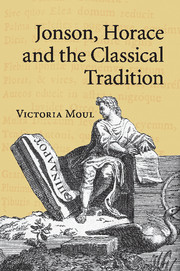Book contents
- Frontmatter
- Contents
- Acknowledgements
- List of abbreviations
- Introduction: imitation, allusion, translation: reading Jonson's Horace
- 1 Jonson's Odes: Horatian lyric presence and the dialogue with Pindar
- 2 Horatian libertas in Jonson's epigrams and epistles
- 3 Competing voices in Jonson's verse satire: Horace and Juvenal
- 4 Poetaster: classical translation and cultural authority
- 5 Translating Horace, translating Jonson
- Conclusion: More remov'd mysteries: Jonson's textual ‘occasions’
- Appendix: manuscript transcriptions
- Bibliography
- Index of passages discussed
- General index
4 - Poetaster: classical translation and cultural authority
Published online by Cambridge University Press: 05 October 2010
- Frontmatter
- Contents
- Acknowledgements
- List of abbreviations
- Introduction: imitation, allusion, translation: reading Jonson's Horace
- 1 Jonson's Odes: Horatian lyric presence and the dialogue with Pindar
- 2 Horatian libertas in Jonson's epigrams and epistles
- 3 Competing voices in Jonson's verse satire: Horace and Juvenal
- 4 Poetaster: classical translation and cultural authority
- 5 Translating Horace, translating Jonson
- Conclusion: More remov'd mysteries: Jonson's textual ‘occasions’
- Appendix: manuscript transcriptions
- Bibliography
- Index of passages discussed
- General index
Summary
In previous chapters we have seen how Jonson employed allusion to appropriate a range of classical genres, including odes, epigrams, epistles and verse satires. In each case, the potency of these adaptions and redeployments resides in their intertextual ‘dialogue’: the way in which the Horatianism of these pieces is set up against, and in contested conversation with, alternative models of tone and genre (Pindar's epinicia, Martial's epigrams, Juvenalian satire). Furthermore, in each case these ‘conversations’ are as politically as they are culturally significant, dealing provocatively with the exigencies and possibilities of the poet's relationship with the great. Whereas those earlier chapters considered a range of Jonsonian examples in each mode, in this chapter I want to look closely at just one work, the early comical satire Poetaster.
Tom Cain concludes his essay on the satiric force of Poetaster by remarking that it: ‘emerges as a play that demands a more prominent place in the Jonson canon than it is normally given’. This chapter is in part an attempt to attend to Poetaster as he suggests, and this attention takes two forms. Firstly, I think it is worth focusing upon the play as a work both composed of and, in some sense, about the act of translation; a work in which translations, as well as the translator, continually challenge us to consider their place in the office of the ‘poet’.
- Type
- Chapter
- Information
- Jonson, Horace and the Classical Tradition , pp. 135 - 172Publisher: Cambridge University PressPrint publication year: 2010



